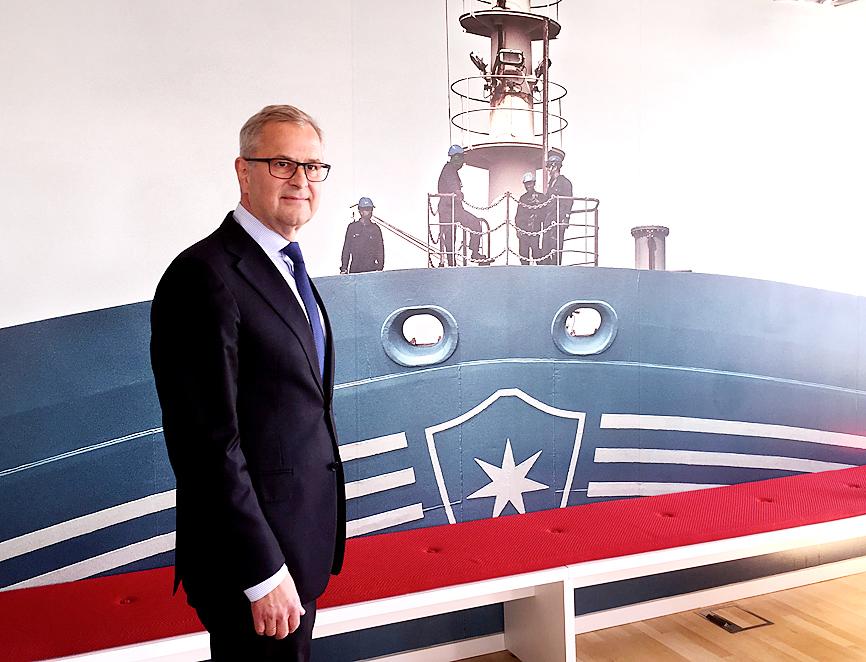A.P. Moller-Maersk A/S, the world’s largest container line, reinstated its full-year guidance at a higher level than it had previously indicated, after staying open for business throughout the COVID-19 crisis.
Shares in the company soared as much as 7.4 percent when trading began in Copenhagen yesterday.
Earnings before interest, taxes, depreciation and amortization (EBITDA) this year would be between US$6 billion and US$7 billion, the company said in a statement.

Photo: Reuters
Before suspending its guidance earlier this year, Maersk had expected profit by that measure to reach about US$5.5 billion.
Analysts surveyed by Bloomberg had predicted US$5.83 billion, on average.
“We were able to continue to serve our customers’ global transportation needs and supply chains throughout the quarter under very difficult circumstances,” Maersk chief executive officer Soren Skou said in the statement. “We were never closed for business.”
The company slashed operating costs by 16 percent in the quarter which, together with a 4.5 percent rise in freight rates, more than offset a 16 percent drop in volumes.
Frode Morkedal, a managing director at shipping firm Clarksons Platou in Oslo, said Maersk’s results suggest that the container shipping market is proving more robust in the face of the COVID-19 crisis than many had feared.
“In our view, freight rates are performing better than expected in 3Q despite liner companies adding back ship capacity to trade lanes, an indication of a stronger demand recovery than expected,” Morkedal wrote in a client note. “We continue to favor Maersk as a recovery bet and we remain constructive to the container-ship market outlook, and see earnings upgrades likely to further support the stock price.”
However, Skou said that the company’s outlook does not include the possibility of a “material” second phase of lockdowns.
He also said that “significant uncertainties remain on demand growth due to COVID-19, global supply growth and bunker prices.”
“Global demand growth for containers is still expected to contract in 2020 due to COVID-19 and for Q3 2020 volumes are expected to progressively recover with a current expectation of a mid-single digit contraction,” Maersk said.
Maersk, which transports about 15 percent of the world’s seaborne freight, reported a second-quarter EBITDA of US$1.7 billion, close to the highest analyst estimate.
The company said on June 17 that the second quarter was developing better than first feared and that EBITDA was expected to be “slightly above” US$1.5 billion.

CAUTIOUS RECOVERY: While the manufacturing sector returned to growth amid the US-China trade truce, firms remain wary as uncertainty clouds the outlook, the CIER said The local manufacturing sector returned to expansion last month, as the official purchasing managers’ index (PMI) rose 2.1 points to 51.0, driven by a temporary easing in US-China trade tensions, the Chung-Hua Institution for Economic Research (CIER, 中華經濟研究院) said yesterday. The PMI gauges the health of the manufacturing industry, with readings above 50 indicating expansion and those below 50 signaling contraction. “Firms are not as pessimistic as they were in April, but they remain far from optimistic,” CIER president Lien Hsien-ming (連賢明) said at a news conference. The full impact of US tariff decisions is unlikely to become clear until later this month

GROWING CONCERN: Some senior Trump administration officials opposed the UAE expansion over fears that another TSMC project could jeopardize its US investment Taiwan Semiconductor Manufacturing Co (TSMC, 台積電) is evaluating building an advanced production facility in the United Arab Emirates (UAE) and has discussed the possibility with officials in US President Donald Trump’s administration, people familiar with the matter said, in a potentially major bet on the Middle East that would only come to fruition with Washington’s approval. The company has had multiple meetings in the past few months with US Special Envoy to the Middle East Steve Witkoff and officials from MGX, an influential investment vehicle overseen by the UAE president’s brother, the people said. The conversations are a continuation of talks that

CHIP DUTIES: TSMC said it voiced its concerns to Washington about tariffs, telling the US commerce department that it wants ‘fair treatment’ to protect its competitiveness Taiwan Semiconductor Manufacturing Co (TSMC, 台積電) yesterday reiterated robust business prospects for this year as strong artificial intelligence (AI) chip demand from Nvidia Corp and other customers would absorb the impacts of US tariffs. “The impact of tariffs would be indirect, as the custom tax is the importers’ responsibility, not the exporters,” TSMC chairman and chief executive officer C.C. Wei (魏哲家) said at the chipmaker’s annual shareholders’ meeting in Hsinchu City. TSMC’s business could be affected if people become reluctant to buy electronics due to inflated prices, Wei said. In addition, the chipmaker has voiced its concern to the US Department of Commerce

STILL LOADED: Last year’s richest person, Quanta Computer Inc chairman Barry Lam, dropped to second place despite an 8 percent increase in his wealth to US$12.6 billion Staff writer, with CNA Daniel Tsai (蔡明忠) and Richard Tsai (蔡明興), the brothers who run Fubon Group (富邦集團), topped the Forbes list of Taiwan’s 50 richest people this year, released on Wednesday in New York. The magazine said that a stronger New Taiwan dollar pushed the combined wealth of Taiwan’s 50 richest people up 13 percent, from US$174 billion to US$197 billion, with 36 of the people on the list seeing their wealth increase. That came as Taiwan’s economy grew 4.6 percent last year, its fastest pace in three years, driven by the strong performance of the semiconductor industry, the magazine said. The Tsai